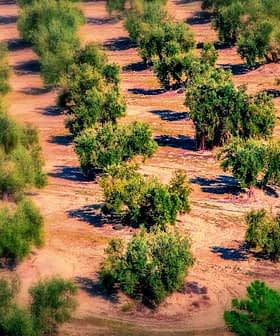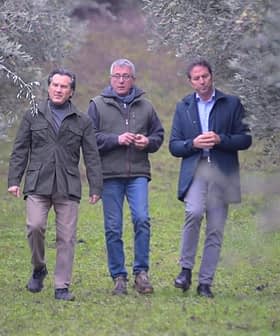Ahead of Climate Summit, African Leaders Discuss Fate of The Continent
Desertification and land degradation are significant issues in Africa, with 45 percent of the continent affected by desertification and 65 percent of productive land considered degraded. Efforts to combat climate change and restore degraded land were discussed at Africa Climate Week 2021, with a focus on projects like the Great Green Wall and the need for urgent action to protect ecosystems and combat climate change.
Desertification affects 45 percent of Africa, while 65 percent of productive land is considered degraded, according to data released by the United Nations’ Food and Agriculture Organization (FAO).
The FAO added that 700 million hectares of degraded land on the continent could be restored. Every year, Africa loses three million hectares of forests.
For Africa, this is a generational crisis and one we will have to adapt to… Africa must come together and chart a course to low-emission growth that is good for all Africans and the world.
These data points have been a central topic at the talks held during Africa Climate Week 2021 (ACW) last week.
See Also:World Failing to Meet Emissions Reductions Pledged in Paris AgreementLeaders from across the continent, representatives of the World Bank, the United Nations Development Program (UNDP) and a number of companies participated in the electronic workshops, aimed at refining the African agenda to combat climate change and curtail its effects.
The projects, pledges and numbers will be discussed at the incoming COP26 climate summit, which will be held in Glasgow starting October 31.
According to the U.N. news service, Sam Cheptoris, minister of water and environment of Uganda, which hosted ACW 2021, said that the 1.5 ºC global temperature rise forecasted in the recent Intergovernmental Panel on Climate Change report“increases risk of severe impacts at a moment in which we are looking to grow quickly.”
“For Africa, this is a generational crisis and one we will have to adapt to,” he added. “In the face of the climate crisis, Africa must come together and chart a course to low-emission growth that is good for all Africans and the world.”
The UNDP regional director for Africa, Ahunna Eziakonwa, has emphasized how the continent has recently witnessed “devastating floods, an invasion of desert locusts and now faces the looming specter of drought because of a La Niña event.”
In presenting the FAO report “Review of Forest and Landscape Restoration in Africa 2021,” Ibrahim Assane Mayaki, chief executive officer of the African Union Development Agency, said “the urgent need to reverse these negative and devastating trends has prompted African leaders to commit to the restoration of the continent’s ecosystems.”
“Through its roadmap for development, Agenda 2063, the African continent commits to ecosystem restoration by protecting, restoring and promoting sustainable use of terrestrial ecosystems, sustainably managing forests and combating desertification,” he added.
Calls for action have multiplied during the ACW 2021 virtual sessions hosted by the African Development Bank and many other international organizations, including the U.N. Environment Program and the World Bank.
Among the projects backed and financed by local governments and international support institutions, all of which are focused on creating new opportunities for local and regional development, is the Great Green Wall.
“Restoring land back to productive good health and protecting forests is a huge and beneficial opportunity for Africa. And it’s urgent,” said Moctar Sacande, an FAO expert and coordinator of the action against desertification in support of the Great Green Wall.
The project aims to turn 8,000 kilometers of African land into a haven for biodiversity, a lively ecological barrier against land degradation.
See Also:€100B in E.U. Spending Fails to Reduce Emissions in Ag Sector, Audit Finds“It’s much more than tree-planting. It’s huge social and economic benefits for rural farming communities,” Sacande said. “It’s a bulwark against climate change. It’s bringing technology to enhance traditional knowledge. It’s supporting dignity and pride.”
The workshops have also focused on the opportunities for local populations that come with the projects to adapt to and combat climate change.
According to the African Development Bank Group, climate adaptation responses also must be built on gender and health inclusion.
“Current efforts to adapt to climate change are simply not sufficient,” said Bannet Ndyanabangi, the U.N. Population Fund’s interim regional director for east and southern Africa. “Moreover, solutions are not always designed to prevent disproportionate impacts on women and girls, as well as other vulnerable or marginalized populations.”
Harsen Nyambe Nyambe, director of the climate and land management branch of the African Union, added, “Africa is suffering crippling effects of the climate crisis. The lack of progress in the last COP25 on key articles that reinforce equity such as finance, loss and damage, gender and markets, is a major concern.”
While large infrastructure companies have pledged to quickly move toward carbon neutrality, focusing on sustainability and renewable energies, farmers remain the key drivers of change in Africa, and in the rest of the world.
FAO officials said farmers have a pivotal role to play since agriculture serves both a contributor to global warming and a weapon to combat climate change, depending on the policies and the practices put in place.
“Farming in harmony with nature, its forests and biodiversity maintains land and landscape productivity and lessens degradation,” the FAO said. “People can harvest crops but also non-timber forest products such as edible fruits, natural oils for soaps, wild honey and plants for traditional medicine, food and feed.”
“The degradation is still reversible, we can turn this situation around,” added Nora Berrahmouni of the FAO Africa forestry office. “The key is community engagement as well as equipment and technology.”
ACW 2021’s organization committee has pledged to discuss the issues and the results of the workshops at the COP26 in Glasgow.









